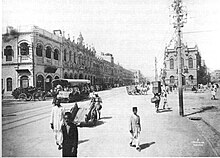User:Rzafar/Sandbox2
Karachi under the British (1839 - 1947)
In 1839, the British occupied the Karachi and over the course of about 110 years went on to make it one of the leading cities of its time.
Occupation (1839)[edit]
1839 - 1843[edit]
Under Charles Napier's Governorship (1843-1847)[edit]
Karachi was to become the provincial capital of Sind during Charles Napier's governorship. On Napier's departure he predicted that this small village would one day become great when he said that, Would that I could come again to see you in your grandeur![1] In 1846, during the cholera epidemic, Napier formed the Conservancy Board to deal with it.
1847-1850[edit]
Napier's departure was followed by the absorption of Sind into Bombay Presidency in 1847. It was decided that the area would have a Chief Commissioner based in Karachi. Robert Pringle, a Bombay Civil Servant became the first. He arrived in Karachi a week before Napier's departure so that he could be acquainted with things.[2]
Bartle Frere's Commissionership (1851-1859)[edit]
During Bartle Frere's Commissionership foundation were laid for many of the future developments in the city.
Frere introduced India's first postal system from Karachi to Hyderabad.[3] In 1852, he directed the Post Master to produced stamps, the result of which were the Scinde Dawks.[3]
Conservancy Board[edit]
Frere revived the old Conservancy Board and in 1852 the Karachi Municipal Commission was appointed.[4] The following year, the Karachi Municipality was formed.[5]
Karachi Port[edit]
Mutiny (1857)[edit]
Farewell[edit]
1859-1867[edit]
In 1864, the first telegraphic message was sent from India to England when a direct telegraph connection was laid down between Karachi and London.[6] In 1865, Bartle Frere, returned to Karachi in his capacity as Bombay Governor and held a Durbar at the Frere Hall.
1867-1877[edit]
1877-1899[edit]

In 1880, a Karachi Harbour Board was constituted to oversee the operations of Karachi's Port. 6 years later, the passage of an Act established the Karachi Port Trust to replace it in 1887.
1900-1914[edit]

At the turn of the century, Karachi became the first city in India to start a tramsystem.[7]
1906 Royal Visit[edit]

In 1906, the Prince and Princess of Wales (later King George V and Queen Mary) visited the city at the end of their Indian tour. While there, they inaugurated Queen Victoria's statue in Frere Hall Gardens.
World War I (1914 -1918)[edit]
Between the two World Wars (1918 - 1939)[edit]

1922 Royal visit[edit]
In 1922, Prince Edward (later King Edward VIII) visited the city at the end of his Indian tour. A group of citizen, collected fund and started Prince of Wales Engineering College (now NED University) in the memory of his visit.
World War II (1939-1945)[edit]
During the Second World War, Karachi was used by the Americans as a base. It was also the host to many refugees from Europe including Poles.
1945-1947[edit]
14th August 1947[edit]
Since, Lord Mountbatten could not be in two places at the same time, Pakistan's handing over ceremony was held on 14th August 1947 in Karachi, which was to become the capital of the newly independent country.
References[edit]
- ^ Karachi City Government, [1] Retrieved 13 February 2008
- ^ Behram Sohrab H.J. Rustomji, Karachi 1839-1947 A Short History of the Foundation and Growth of Karachi in Karachi During the British Era Two Histories of A Modern City, Oxford University Press, Karachi, 2007 Pg 38
- ^ a b Behram Sohrab H.J. Rustomji, Karachi 1839-1947 A Short History of the Foundation and Growth of Karachi in Karachi During the British Era Two Histories of A Modern City, Oxford University Press, Karachi, 2007 Pg 41
- ^ Behram Sohrab H.J. Rustomji, Karachi 1839-1947 A Short History of the Foundation and Growth of Karachi in Karachi During the British Era Two Histories of A Modern City, Oxford University Press, Karachi, 2007 Pg 91
- ^ Behram Sohrab H.J. Rustomji, Karachi 1839-1947 A Short History of the Foundation and Growth of Karachi in Karachi During the British Era Two Histories of A Modern City, Oxford University Press, Karachi, 2007 Pg 86
- ^ Karachi City Government, [2] Retrieved 13 February 2008
- ^ Karachi City Government, [3]. Retrieved 13 February 2008
See Also[edit]
Further Reading[edit]
- The Memoirs of Seth Naomul Hotchand
- Baillie, Alexander F. Kurrachee Past, Present and Future, 1890. Reprints available.
